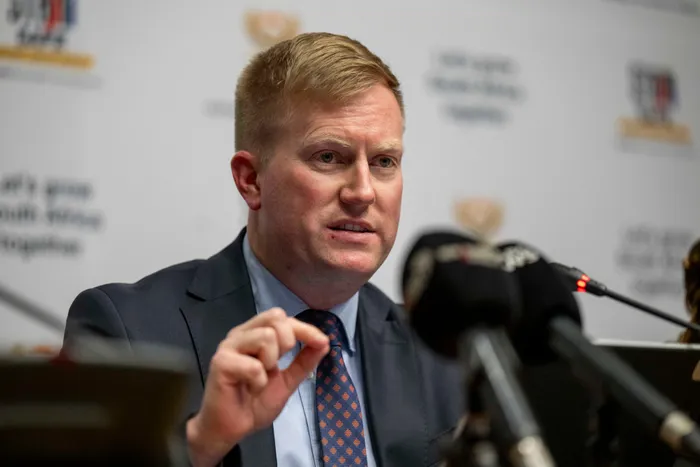
Minister of Public Works and Infrastructure Dean Macpherson launched the Infrastructure Audit Programme on Tuesday at the Public Works & Infrastructure Summit in Sandton. Macpherson said that the programme will ensure there is always compliance and optimal resource utilisation.
Image: Henk Kruger/Independent Newspapers
Minister of Public Works and Infrastructure, Dean Macpherson, has launched the Infrastructure Audit Programme which will ensure there was always compliance and optimal resource utilisation.
Speaking at the Public Works and Infrastructure Summit on Tuesday, Macpherson said the programme will help strengthen internal auditing capacity within the department and its Property Management Trading Entity.
"The primary objectives of the Infrastructure Audit Programme are to: Firstly, to ensure compliance, risk mitigation, and optimal resource utilisation. Secondly, to address gaps in project execution, including planning, design, procurement, and facilities management," he said.
"And finally, to align our efforts with the National Development Plan to ensure that infrastructure investments contribute to economic growth and job creation."
Macpherson said the first phase of implementation, which began in December, has already deployed 15 practitioners—a mix of graduates and registered professionals—who are now actively working on high-risk areas such as immovable asset management, lease agreements, and facilities maintenance.
He said that in the nine months he has been in office, major progress has been achieved to turbocharge infrastructure delivery.
Macpherson said that global research had shown that where infrastructure spending is increased by 1% of GDP, the economy grows by an additional 1.5%.
Macpherson said the department was already making good progress on an ambitious target of attracting an additional R100 billion in infrastructure investment in the next four years.
He said that over the past few months, they have strengthened the department through the filling of key vacancies and the introduction of a new accountability mechanism
“This year, we also launched a skills audit within the department to ensure we have the skills necessary to execute our mandate," he said.
"We have launched independent investigations into a number of failed projects, including the close to R1 billion Telkom Towers project in Tshwane, and the Independent Development Trust Oxygen Plant tender. We are working to improve our ability to deliver infrastructure projects and quickly intervene where things go awry."
Macpherson added that they are establishing a Special Projects Unit within the department specifically to address failed or stalled construction projects.
"We are hoping to expedite the construction of similar failed projects by making use of the trusted panel of contractors, which I announced in my address to the National Assembly last year," he said.
Macpherson said that the Construction Industry Development Board, or CIDB, has also been tasked to get ahead of underperforming contractors and blacklist them without delay, and to ensure that they are unable to gain any tenders from any sphere or entity of the State.
"Within the months ahead, the pace at which companies are delisted should be rapidly increased, with over 40 companies facing blacklisting," he said.
Macpherson added that they are turning Infrastructure South Africa, or ISA, into the central point for all major infrastructure projects in South Africa.
"I am very pleased with the work ISA has been doing to ensure that projects are brought to the market. The conclusion of the first bid window for project preparation valued at R180 million attracted 220 bids valued at R1.23 trillion. It is thus very clear that South Africa does not have an infrastructure pipeline problem."
BUSINESS REPORT
Related Topics: